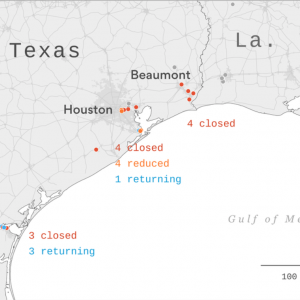2016 Tanker Spill Data
The International Tanker Owners Pollution Federation presented their most recent summary (as of 2016) of large oil spill.
We had only a single large tanker spill (>700 tons) in 2016. This spill of gas and diesel happened in the Gulf of Mexico. Roughly 5,500 tons of oil was burnt in the explosion and ensuing fire. The total amount of oil lost at sea through tanker incidents in 2016 was ~6,000 tons and mostly due to the Gulf of Mexico spill.
Four medium-sized spills (7 to 700 tons) were also reported in 2016:
- South America in January-crude oil spilled during loading operations
- Malaysia in August-marine fuel oil spilled during loading operations
- unidentified spill in the USA
- unidentified spill in China, host of the meeting
Large Oil Spills
When looking at the frequency and quantities of oil spilt, few very large spills are responsible for a high proportion of the oil spilled. For example, in more recent decades the following can be seen:
· In the 1990s there were 358 spills of 7 tonnes and over, resulting in 1,133,000 tonnes of oil lost; 73% of this amount was spilt in just 10 incidents.
· In the 2000s there were 181 spills of 7 tonnes and over, resulting in 196,000 tonnes of oil lost; 75% of this amount was spilt in just 10 incidents.
· In the seven year period 2010-2016 there have been 47 spills of 7 tonnes and over, resulting in 39,000 tonnes of oil lost; 83% of this amount was spilt in just 10 incidents.
In terms of the volume of oil spilt, the figures for a particular year may be severely distorted by a single large incident. This is clearly illustrated by incidents such as ATLANTIC EMPRESS (1979), 287,000 tonnes spilt; CASTILLO DE BELLVER (1983), 252,000 tonnes spilt and ABT SUMMER (1991), 260,000 tonnes spilt.





Leave a Reply